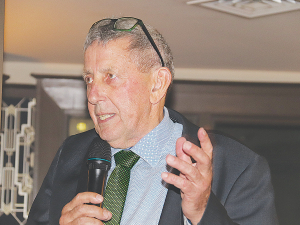Raised on a sheep and beef farm near Hunterville in the lower North Island, Forrest completed a BAgSci at Massey then returned to work on the family farm.
In the late 1980s, he got involved in farmer politics and eventually rose to becoming vice president of the newly formed/Manawatu/Rangitikei branch of Federated Farmers.
But then he jumped ship, as it were, and joined Feds as a regional policy advisor and later moving to Wellington and then Christchurch to head up the organisation's group.
A change of chief executives saw Forrest quit Feds and join the then MAF as a Rural Affairs Co-ordinator. In 2009, he was appointed as the agricultural private secretary to the then Minister of Agriculture, David Carter, and later Nathan Guy - a job he says he greatly enjoyed. This role lasted for four years after which he went back to MPI before finally returning to Feds as a general manager policy.
During his time in the sector, Forrest has seen and been a part of many changes - as well as playing an integral part in changing government policy. One of the highlights he told Rural News about was getting ACC to lower its premiums to farmers. Another was sorting out the complex issue of farm vehicles on roads.
His mantra as an advocate was based on the advice of his father who told him, when negotiating, always leave something on the table and don't go in hard at the start.
"The aim being to get a fair and equitable outcome," he explains. "Also, never personalise anything because people may actually agree with you but can't say so."
Forrest says many officials are not aware of the intricacies of farming and he believes it is the role of the sector to educate these people, because often their ignorance is quite innocent.
Another point he makes is the importance of the role of agricultural private secretary to the Minister of Agriculture.
He says this role is undervalued because the right person with experience and knowledge can pre-empt problems or misunderstanding at a political level and pave the way for quality outcomes.
"I think the role is critical, in the sense that you get to know the minister better than the CEO of the department, because you are working alongside them on a daily basis," he explains. "You are picking up the non-verbal stuff and can tell if a minister needs more information or clarification."
Forrest has seen many changes over the years and the fortunes of Feds wax and wane. He says the voice of organisations such as Feds, and other major lobby groups, are not being heard like they used to be. He says the changing nature of the media is probably a factor in this.
"I think some government agencies have forgotten that lobby groups provide free advisory and consultancy services, which they could use," he told Rural News. "But I think there is some suspicion around advocacy groups, which is a pity."
Now that he's retired, Forrest has gone on holiday and has plans to build a new house with his partner. However, there is no mention of work - at least for the meantime.
The Good and Great Pay Tribute
More than 100 people, from right around the country, came to pay tribute to Gavin Forrest on his retirement from the ag sector.
Guests included two former Ministers of Agriculture, Sir David Carter and Nathan Guy, the present Associate Minister of Agriculture Jo Luxton, former Feds presidents William Rolleston and Katie Milne. Also attending were Sam McIvor, B+LNZ's chief executive, and Kimberly Crewther, executive director of DCANZ. They all gathered to celebrate a man whose advocacy has helped make the primary sector more effective and efficient.
Guests were invited to give their own tributes to Forrest and the common theme was his outstanding knowledge and the way he handled himself during complex and difficult negotiations. McIvor praised his role in developing closer relations between B+LNZ and Federated Farmers. He also described Forrest as being fearless and said what needed to be said at difficult times.
Feds chief executive Terry Copeland also paid tribute to Forrest saying the organisation will miss him. Rolleston joked that Forrest never opened or read any of his emails, but said he was master of good policy and good robust debate.

















